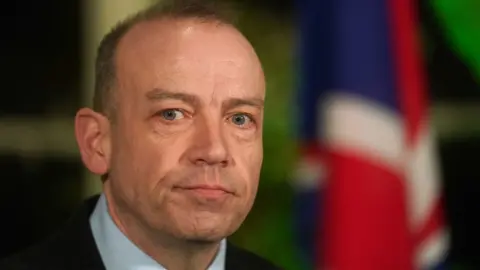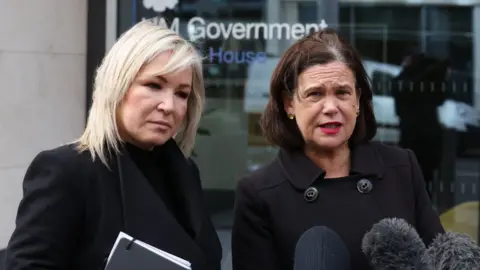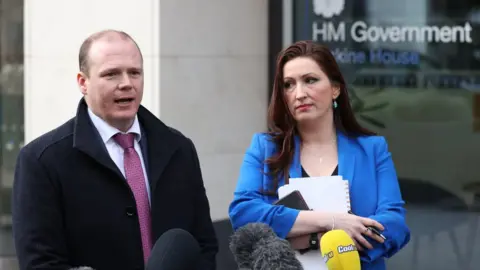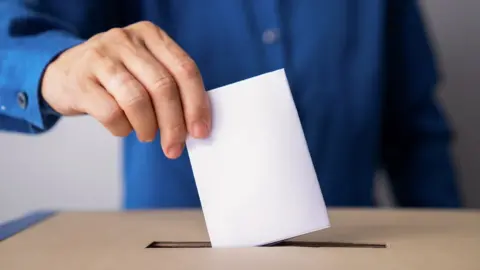Stormont: Assembly election delayed by up to a year
 Brian Lawless/PA
Brian Lawless/PAThe government will delay the requirement for forming an executive and holding an assembly election in Northern Ireland for another year.
The Northern Ireland secretary is introducing legislation that will push the timetable back to 18 January 2024.
Chris Heaton-Harris has previously delayed the legal duty on him.
Earlier, he held round table talks with the five main political parties to discuss the plan as the stalemate at Stormont continues.
In a written update to Parliament, he said the bill would provide for a "single retrospective extension of the executive formation period for one year".
"That would mean that, if the parties are unable to form an executive before 19 January 2024, I would again fall under a duty to hold an assembly election within 12 weeks.
"The legislation will also enable the government to bring this new period to an early end and move to elections sooner, if necessary."
The Northern Ireland secretary met the five main Stormont parties on Thursday for round-table talks to discuss the current budget and decisions taken by permanent secretaries running Stormont's nine departments.
 PA Media
PA MediaAn update on negotiations between the UK and EU on the Northern Ireland Protocol was also provided.
Speaking after the meeting, Sinn Féin leader Mary Lou McDonald called Mr Heaton-Harris's proposal "legislation for further drift".
"We need decisions now, we need a result now, the north needs government now and obviously we need a budget to match the needs here in the society," she said.
Democratic Unionist Party (DUP) assembly member Gordon Lyons said the deadline extension was not a way of "kicking the can down the road" and provided an opportunity for the government to resolve ongoing issues surrounding the protocol.
"Ultimately we need to make sure that there is the right outcome on the protocol," he said.
 PA Media
PA MediaAlliance leader Naomi Long criticised the proposed legislation, adding if there was not an election, plans needed to made to deal with the issues facing Northern Ireland.
"Whilst we don't believe that an election will bring an immediate resolution to the problems we face, we don't believe simply kicking the can down the road at every turn is the answer."
Ulster Unionist Party leader Doug Beattie described discussions surrounding the 2023/24 budget as frustrating and tetchy.
Social Democratic and Labour Party MP Claire Hanna said it was a "colourful meeting", and stressed dual market access was key to growing Northern Ireland's economy.
'Not best course of action'
Mr Heaton-Harris said restoring the executive remained his top priority.
He added that having spoken to political and business representatives, he had concluded another election at this time was not the best course of action to facilitate the restoration of the executive.
Allow X content?
The Northern Ireland secretary made reference to his discussions in Brussels on Wednesday with EU chief negotiator Maroš Šefčovič about the Northern Ireland Protocol.
The UK and EU have been working towards finalising a deal.
Mr Heaton-Harris said he was "clear this extension does not influence protocol discussions".

Analysis: Deadline, what deadline?
At the very least that's what some might be thinking now that Chris Heaton-Harris has kicked the election can down the road once more, imposing new dates that could drift just as easily as previous ones have.
He's following a path taken by some of his predecessors and the fact he has opted for extension over election is no surprise, but it does tell us several things.
Firstly, it indicates that the secretary of state wants to avoid the pattern that's been developing of introducing fresh legislation each time the deadline for reforming an executive expires.
It also suggests that the government has given up any hope of seeing Stormont restored in time for the 25th anniversary of the Good Friday Agreement, which is just over two months away.

When could an election be held?
 Getty Images
Getty ImagesMr Heaton-Harris has been under a legal duty to call a fresh assembly election since mid-January after the DUP failed to end its boycott of the Northern Ireland Executive.
The party withdrew its First Minister Paul Givan from the executive in February 2022 in protest over the Northern Ireland Protocol and has not returned.
The political stalemate also meant it fell to Mr Heaton-Harris to set a budget for the current financial year, which ends next month.
Last week came a warning that public services provided by Northern Ireland Executive departments face cuts of at least £500m in 2023-24.
Under the terms of the proposed legislation, if an executive is not restored by 18 January 2024, the earliest an election could then take place would be 29 February with the latest poll date 11 April.
The legislation is expected to be debated by MPs in the House of Commons on 22 February.
But the government said elections may still be called at any time during this year if deemed necessary or required.
